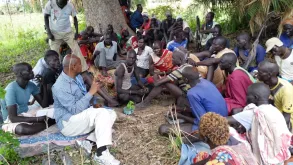Solomon Bekele is a UN Volunteer Pastoralist Literacy and Education Specialist with UNESCO in Juba, South Sudan. He serves as Field Manager with the Enhanced Knowledge and Education for Resilience Pastoralist Livelihoods project. This is a three year EU-funded project being implemented in the former Lakes State. The project is implemented by UNESCO, in partnership with the UN Food and Agriculture Organization (FAO), and government line ministries, Ministry of Education, Agriculture and Animal Resources.
Solomon focuses on supporting UNESCO's education component of the project, implementing literacy and numeracy programmes at cattle camps within the Lakes State pastoralist communities.
"As a volunteer, I have gained experience and understanding of the diverse ways of life of communities in the pastoral communities. I am glad I am helping build their capacity and resilience."
In the first step, UNESCO/FAO (the project) trained 32 community facilitators, who are now facilitating learning in the cattle camps, and 15 county facilitators drawn from government offices, who provide support and closely monitor the project. This approach ensures local engagement and long-term programme sustainability. Solomon says that "county and community facilitators are getting back-up, technical support and necessary materials from UNESCO in relation to implementing the integrated curriculum at the field level”. As part of UNESCO staff and UNV, Solomon is a highly skilled professional human resource input to the achievement of the project objectives.
As a result, 1,064 children, adolescents and adults from pastoral communities in five counties are attending literacy, numeracy and life skills training programmes. These include 278 children, 477 youth and 309 adults. Some 252 participants are girls and women. The life skill training is integrated in the accelerated learning curriculum given to particularly to youths aimed at building the capacity and attitude to resolve conflicts and contribute to peace building.
Solomon provides technical support to the community facilitators and to the teachers who provide the learning in cattle camps. He is also involved in building the capacity of the county and community facilitators to implement the curriculum, and guides facilitators to prepare lesson plans. The outcomes from Solomon's voluntary role are far reaching, ensuring that "the literacy, numeracy and life skills activities initiated are being implemented in the pastoral communities at cattle camps".
Through his function in the Enhanced Knowledge and Education for Resilience Pastoralist Livelihoods project, Solomon liaises with the UNESCO Head Office to develop and source learning materials, and participating in regular state-level technical working group meetings.
"As a volunteer, I have gained a lot of experience relating to professional aspects, as well as working with people having diverse areas of expertise, culture, background and experiences."
He also represents UNESCO within the education cluster in the Lakes district, and liaises closely with partner stakeholders FAO and government representatives, making his role as a UN Volunteer professionally diverse and deeply rewarding.
Bio: Solomon is 43 years old, married and is from Ethiopia. He has a Master of Arts degree in Educational Research and Development from the School of Graduate Studies, Addis Ababa University, and has been volunteering with the UN in South Sudan since April 2016.
Article drafted with the support of UN Online Volunteer Bev Byron.

